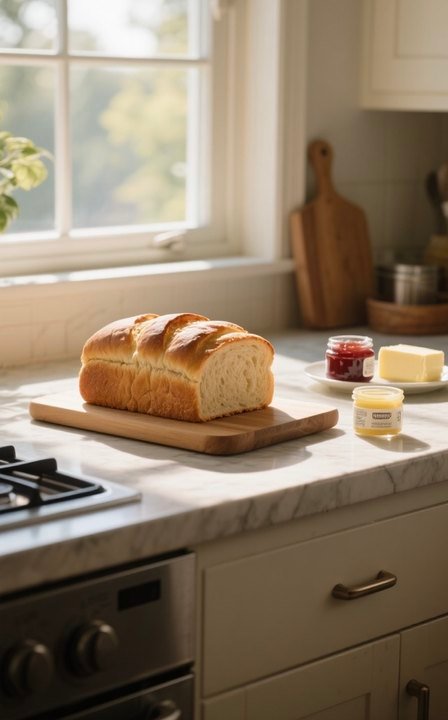Why Kitchen Countertops Deserve More Attention
Kitchen countertops are the true workhorses of our homes. We chop vegetables, prepare raw meat, pour coffee, pack lunches, and sometimes place groceries or bags directly onto them. Yet, despite daily cleaning, countertops remain one of the most exposed and contamination-prone surfaces in any household.
Think about it:
- Raw chicken juices may seep into tiny surface pores
- Damp dishcloths left on the counter create warm, moist spots
- Crumbs, sauces, and splashes become invisible residue over time
These factors create a welcoming environment for bacteria, mould, and even odour-causing microbes to thrive, especially on materials with microscopic surface imperfections.
What Are Antimicrobial Agents and How Do They Help?
Antimicrobial agents are substances that actively inhibit or destroy microorganisms such as bacteria and fungi. When added to countertop materials, they provide a built-in layer of protection against microbial growth, preventing colonies from forming on the surface.
There are different types of antimicrobial agents, but for kitchen surfaces, inorganic agents such as silver, copper, and zinc-based compounds are widely used because of their durability and broad-spectrum efficacy.
Here’s how they work:
- Silver ions (Ag⁺) attach to microbial cell walls, disrupt internal enzyme systems, and block DNA replication, effectively killing bacteria and mould.
- Copper ions (Cu²⁺) damage cell membranes and cause oxidative stress inside microbes, leading to rapid inactivation.
- Zinc ions (Zn²⁺) inhibit key enzymes required for microbial metabolism, preventing growth and reproduction.
How Are Antimicrobial Agents Integrated into Countertops?
1. During Material Manufacturing
For engineered stone (quartz) countertops:
- Silver, copper, or zinc-based additives are mixed directly into the resin binders before they are combined with stone aggregates and pressed into slabs.
- This ensures antimicrobial protection throughout the entire slab, not just on the surface. Even if the countertop is scratched, the antimicrobial function remains effective.
For solid surface countertops (e.g. acrylic-based brands):
- Antimicrobial agents can be added to the acrylic polymer mix during casting, resulting in even distribution within the material’s structure.
2. As Surface Treatments or Coatings
For natural stone countertops (granite, marble):
- While natural stones themselves are not antimicrobial, surface sealers containing antimicrobial agents can be applied to create a protective barrier.
- These sealers penetrate surface pores, reducing bacterial adhesion and making cleaning more effective.
For laminate countertops:
- Antimicrobial additives can be incorporated into the top decorative layer during production, offering continuous protection against bacterial buildup.
What Are the Benefits for Kitchens?
✅ Continuous Protection Between Cleans
Regular wiping removes visible dirt, but bacteria can remain in micro-scratches or surface pores. Antimicrobial agents work around the clock to keep microbial counts low between cleaning sessions.
✅ Reduced Staining and Odours
Bacteria and mould can produce pigments or metabolites that stain countertop surfaces. By preventing microbial growth, antimicrobial countertops stay looking clean and fresh.
✅ Improved Hygiene and Food Safety
In food preparation areas, reducing bacteria like Salmonella or E. coli is critical. While antimicrobial agents do not replace cleaning, they provide an additional safety net to minimise cross-contamination risks.
✅ Extended Material Longevity
Microbial growth, especially mould or mildew, can degrade some countertop sealants or cause discolouration over time. Antimicrobial treatments protect material integrity, preserving aesthetics and function.
✅ Peace of Mind for Homeowners
Knowing that countertops actively resist microbial buildup enhances user confidence in kitchen hygiene, especially for families with young children or elderly members.
Popular Countertop Materials Enhanced with Antimicrobial Agents
Engineered Quartz
Many quartz countertop brands market antimicrobial protection as a premium feature. The non-porous nature of quartz, combined with antimicrobial agents, offers superior hygiene benefits.
Solid Surface (Acrylic-Based)
Used in both residential and commercial kitchens, solid surface countertops benefit from built-in antimicrobial properties that maintain their smooth, easy-to-clean surfaces.
High-Pressure Laminate
In budget-friendly kitchens, laminate countertops with antimicrobial additives in their decorative layer offer protection comparable to higher-end materials, enhancing market appeal.
Natural Stone with Antimicrobial Sealers
While granite and marble remain popular for their aesthetics, applying antimicrobial sealers helps address their natural porosity and hygiene concerns.
Considerations for Manufacturers and Consumers
For manufacturers:
- Selecting the right antimicrobial agent that maintains compatibility with resins or polymers is crucial.
- Formulations must avoid altering colour, translucency, or gloss of countertop surfaces.
- Regulatory compliance is essential, as antimicrobial claims on kitchen surfaces require adherence to local and international standards.
For consumers:
- Antimicrobial countertops are not a substitute for cleaning. Regular wiping with mild detergents is still necessary.
- Avoid harsh abrasives that can damage both the countertop surface and the antimicrobial treatment.
Future Trends: Smarter, Safer Surfaces
The countertop industry is evolving rapidly. Future directions include:
- Multi-functional countertops, combining antimicrobial agents with scratch resistance, UV stability, and stain repellence.
- Sustainable antimicrobial formulations, using eco-friendly carriers and minimising environmental impact during manufacturing.
- Smart countertops, with integrated wireless charging or sensors for temperature and hygiene monitoring, paired with antimicrobial protection for comprehensive kitchen safety.
Final Thoughts
Kitchen countertops are where food meets family life – from weekday meal prep to holiday baking. Ensuring these surfaces remain hygienic, fresh, and durable is essential for both health and home aesthetics.
Antimicrobial agents make this possible. Whether embedded in engineered stone, added to acrylic solid surfaces, or incorporated into protective sealers, they work quietly in the background, fighting bacteria and mould so that homeowners can focus on what matters most: enjoying their kitchens with confidence.
Contect us
Want to learn more about integrating antimicrobial agents into your countertop materials or other home surface product? Contact our team today for tailored solutions and technical support to enhance your product offerings.


-300x210.jpg)
